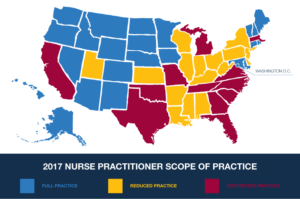
The United States is currently in the midst of a physician shortage. In fact, the Association of American Medical Colleges estimates a shortfall of between 46,100 and 90,400 physicians by 2025. Meanwhile, the demand for healthcare services continues to increase due to an aging baby-boomer population and recent healthcare legislation. Because the supply of healthcare providers is not meeting the demand, nurse practitioners are stepping up to the plate to provide high-quality, cost-effective care.
The Role of the Nurse Practitioner
Nurse practitioners are advanced-practice nurses who have earned either a master’s degree or doctoral degree in nursing. They can work in a multitude of care areas from primary care to acute care, and provide many services that physicians provide to include ordering treatments, diagnostic tests, and medications, taking patient history and performing physicals, and managing the overall health of patients. More and more NP positions are springing up to meet the demand of healthcare consumers. The projected employment for NPs is expected to rise 36% by 2026, which helps meet the growing needs of patients.
Nurse Practitioner Scope of Practice
While it would be reasonable to think that NP scope of practice would be consistent nationwide as a result of the physician shortage, this is unfortunately not the case. Nurse practitioners have faced an uphill battle when lobbying for more independent practice, and scope of practice differs between states. According to the American Association of Nurse Practitioners, twenty-three states allow the independent practice of NPs. Sixteen states have reduced practice, and twelve states have restricted practice.
In the 1980s, states with more rural and remote areas were among the first to allow nurse practitioners more independent practice, as physicians were few and far between. More states granted NPs autonomy in the 1990s, and with the passage of the Affordable Health Care Act, states are slowly but consistently joining the list. However, some of the larger states such as California, Florida, and Texas still have restrictions on NP practice. If or when these states allow full independent practice, a considerable number of patients will have greater access to care.
Barriers to Independent Practice
While nurse practitioners offer holistic, comprehensive care to patients, some argue (and lobby against) independent practice. Some feel that the care given by NPs cannot be comparable to that of a physician because of the difference in schooling and clinical training. Some physicians even perceive the increasing number of NPs as a threat to their profession. Additionally, while NPs can practice independently and at a lower cost, reimbursement by Medicare is lower than that of physicians. The bottom line is that they don’t bring in the revenue that physicians do. For these reasons, campaigns from certain parties have blocked legislation allowing the independent practice of nurse practitioners.
Current Progress Towards Independent Practice
Slowly but surely, nurse practitioner authority continues to increase. The VA recently granted full authority to advanced-practice nurses, including NPs. South Dakota also recently authorized full autonomous practice. There is also the APRN Campaign for Consensus that is working to assist states in standardizing their NP laws and regulations-including independent practice and prescribing.
Moving Forward
There are many benefits to having NPs as independent practitioners. They help lower healthcare costs, as patients who have NPs as their primary care provider have fewer ER visits and shorter hospital stays. They also have a high level of patient satisfaction. Not only do NPs provide quality care to patients, but they also provide a great deal of patient education, they participate in research, and they serve as mentors.
The future of healthcare is unpredictable. As of now, the bottom line is that more Americans need better access to medical care. Nurse practitioners offer comprehensive, high-quality care. Ensuring patients have access to healthcare providers should be something we all strive to achieve.
